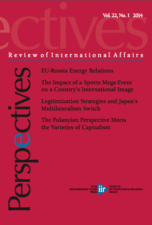Legitimization Strategies and Japan’s Multilateralism Switch
Legitimization Strategies and Japan’s Multilateralism Switch
Author(s): Michal KolmašSubject(s): Politics / Political Sciences
Published by: Ústav mezinárodních vztahů
Keywords: Japan; multilateralism; bilateralism; constructivism; discourse; typology; APEC; ARF
Summary/Abstract: By the end of the 1990s, Japan began to have a new foreign policy approach. The bilateralism that was typical for the ColdWar period started to be contested by Tokyo’s multilateralism incentive, as Japan took part in a number of organizations, such as APEC or the ARF. While its commitment to multilateralism seemed imminent, at the time of the global financial crisis, Japan remained faithful to its bilateral alliance with the United States. The dilemma between this alliance and Japan’s will to multilateralism needs to be addressed. The article addresses it by providing an analysis of Japan’s discourse connected to its membership in the two organizations, which were crucial for Tokyo’s new multilateralism. It creates a typology of legitimization practices based on IR theory and Theo Van Leeuwen’s discursive modes of legitimization – the instrumental, moral and social modes. The article then tests this typology on Japan’s primary discourse and comes to the conclusion that while moral and social legitimization were crucial in the first stages of Tokyo’s multilateral strategy, an instrumental strategy became dominant in the later stages.
Journal: Perspectives : Review of International Affairs
- Issue Year: 2014
- Issue No: 1
- Page Range: 49-75
- Page Count: 27
- Language: English

